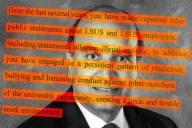You have /5 articles left.
Sign up for a free account or log in.
WASHINGTON -- More than a fifth of colleges nationwide allow their athletic departments to oversee sexual assault cases involving student-athletes, according to the results of a survey released Wednesday by Senator Claire McCaskill.
In addition, more than 40 percent of colleges responding to the survey said that they had not conducted a single investigation of sexual assault in the past five years -- a finding that the Democratic lawmaker called “unbelievable.” The survey included a range of institutions, including large public institutions, private colleges and for-profit institutions.
Hear the Report Analyzed
Inside Higher Ed's weekly news podcast, This Week, will explore the report, and other issues, on Friday. Guests will be Laura Dunn, executive director of SurvJustice, and Kevin Kruger, president of NASPA: Student Affairs Administrators in Higher Education. Sign up for This Week notification here.
McCaskill is working with a bipartisan group of Senators to craft new legislation aimed at combating sexual assault. The results of the survey, she said, should serve as a "wake-up call" because they show that many colleges are violating the law and failing to follow best practices in how they handle sexual assault cases.
"We think it’s really important that this information be used aggressively to inform colleges and universities that they are falling short," she told reporters Wednesday.
Among her concerns, she said, was the fact that a majority of institutions do not have protocols for how they work with local law enforcement to handle sexual assault cases. Many are also failing to adequately train employees and students. About one-third of the colleges responding to the survey said they don’t provide any training for students on dealing with sexual assault.
In addition, very few institutions -- only 16 percent -- reported using annual anonymous surveys to gauge student views about the climate surrounding sexual violence at their institutions. Victims’ advocates have been pushing more colleges to adopt such “climate surveys.” Earlier this year, the White House urged all institutions to conduct those evaluations.
McCaskill said she was also disappointed to learn that nearly half of colleges responding to her survey reported that students were involved in the adjudication of sexual assault cases on campus. Such a system creates conflicts of interest and discourages victims from coming forward, she said.
Special Treatment for Athletes?
McCaskill said she was particularly struck that 22 percent of a national sample of colleges reported that they had a policy or procedure that gives the athletic department oversight over sexual assault allegations made against athletes. About 20 percent of the nation’s largest public institutions and 15 percent of the largest private institutions had such a policy, the survey found.
“This, to me, is borderline outrageous,” she said. “It is hard enough to get a victim to come forward when there is at least a perception that the process is going to be fair. It is hard to imagine a victim that would be willing to come forward if they knew that the athletic department is going to be making all of the decisions on the case when the alleged perpetrator is, in fact, a scholarship athlete within their department.”
Many prominent cases in which colleges have been accused of failing to take assaults seriously have involved athletes.
Mark Emmert, president of the National College Athletic Association, said Wednesday that he was “surprised and dismayed” that the survey suggested that some athletic departments are responsible for adjudicating the sexual assault allegations made against their players.
Questioned by McCaskill at a previously-scheduled Senate commerce committee hearing about college athletes, Emmert said that any such policies were “inappropriate” and created “enormous” conflicts of interest.
Emmert pledged to raise the issue with NCAA leadership at their meeting in August.
“This is really inappropriate and we need to find ways to make sure that athletic departments are not the ones who are responsible for adjudication of these issues because of all of the obvious concerns that you raise,” he told McCaskill.
Lack of Training
McCaskill’s report also says that many colleges are not doing a good job of training the individuals who adjudicate sexual assault cases. About one-third of institutions reported that they do not provide such personnel with training in best practices on sexual assault prevention.
Alison Kiss, director of the Clery Center for Campus Safety, said that the lack of training on campuses is particularly troublesome. “That certainly raises concerns because the only way we can be proactive in dealing with sexual violence and sexual assault is with training,” she said.
One problem Kiss said she has encountered is the “lone-soldier syndrome” where sexual assault issues are the responsibility of just one person on campus. (McCaskill’s survey also found that more than 10 percent of colleges don’t have a designated Title IX coordinator, even though they are required by law to have one.)
Institutions often put a lot of resources behind campuswide training after someone has filed a federal complaint, but she said the challenge is to institutionalize that training before there are problems.
Tensions with Higher Ed
The American Council on Education, the main lobbying group for higher education, on Wednesday pushed back strongly against McCaskill’s report, calling it unfair and incomplete.
Ada Meloy, the group’s general counsel, said that colleges were “greatly disappointed” by the report, describing it as “a blanket indictment that draws unwarranted conclusions and ignores how hard colleges and universities are working to address this serious and complex societal issue.”
She said the report ignores how difficult it is for institutions to investigate and resolve the cases.
“There’s often word-on-word situations with little or no physical evidence, no witnesses,” Meloy said. “You have alcohol and drug use, and impaired memories and judgment. And they’re cases that even law enforcement authorities are unwilling to take on.”
McCaskill previously accused the American Council on Education of interfering with her efforts to survey colleges by sponsoring a webinar in which a law firm advised institutions about the risks associated with responding to the request for information.
The initial request for information from 350 institutions yielded 236 responses, McCaskill said, a response rate of 67 percent.
The legislation is expected to be introduced in late August or early September, she said.








